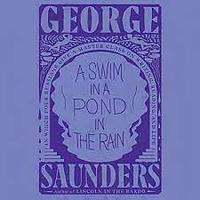Take a photo of a barcode or cover
1.51k reviews for:
A Swim in a Pond in the Rain: In Which Four Russians Give a Master Class on Writing, Reading, and Life
George Saunders
1.51k reviews for:
A Swim in a Pond in the Rain: In Which Four Russians Give a Master Class on Writing, Reading, and Life
George Saunders
One of the better books about writing I’ve found, this one focused on product/method rather than writing process. Saunders uses a group of short stories (seven I think) as material for his class in how to write stuff that works.
The stories are all pretty different - the opportunity for a side by side stylistic comparison is reason enough to enjoy this book. Two favorites of mine were from the lesser-known-to-me writers - Turgenev and Gogol.
Turgenev’s story, The Singers was mostly background on characters which broke a number of conventional rules about keeping primary focus here and now. But then he wraps the story up by leveraging the character background to show us deep emotional effect made by the second of two singers, the point of the story.
Gogol’s story “The Nose” was ridiculous from start to finish. And it works beautifully. If I could imagine a way to imitate without it being obvious, I’d love to try. It’s as if one detail at a time defies logic, but all others hold true. I won’t try to explain it - read for yourself, it’s worthwhile.
The others (mostly about Chekhov and Tolstoy) were good, useful lessons, all delivered with Saunders’ adept, colorful voice. Worthwhile for understanding how to balance craft and form.
What maketh a 5-star book?
I am a tad parsimonious with my stars (and high opinion), if I am being completely honest. So by my scale, 4 stars is a great book. 4 stars is always where my objectivity ends. For a book to get the elusive 5th star, it has got to be personal, it has got to mean something to me, and it's often something that I didn't even know to anticipate.
So yes, this is a great book. I picked it up thinking I would learn a thing or two about literary analysis, and I learned more than two things. In fact, there was so much to mine here that I am positive I will have to revisit this many times;if only to review all the highlighted sections on writing tools. And Saunders has even managed to woo me to the side of short stories (reading which has always been an arduous task). But what got me in my literal feels and figurative cold, carping heart is all the tidbits about the authors, and their opinions of each other.
I had showed up late to the Chekhov fan club, but I showed up a full convert. Tolstoy I have always been intimidated by, and while I have taken issue with his values, I never did dare pretend I could even begin to critique his work Call it siloed learning or just being a bit thick, but it never occurred to me that all the Russian authors I’ve ever read were contemporaries. That they interacted, inspired, debated, and even critiqued one another.
Look, I am struggling to express how unequivocally cool it is for your heroes to be bros with your other heroes.
Chekhov views Tolstoy the same way I do? Get out of here! Gogol makes them just as dizzy as he makes me? I can't even.
If, and hopefully when, you read this book, take your time with it. Some things deserve to be patiently relished.
I am a tad parsimonious with my stars (and high opinion), if I am being completely honest. So by my scale, 4 stars is a great book. 4 stars is always where my objectivity ends. For a book to get the elusive 5th star, it has got to be personal, it has got to mean something to me, and it's often something that I didn't even know to anticipate.
So yes, this is a great book. I picked it up thinking I would learn a thing or two about literary analysis, and I learned more than two things. In fact, there was so much to mine here that I am positive I will have to revisit this many times;if only to review all the highlighted sections on writing tools. And Saunders has even managed to woo me to the side of short stories (reading which has always been an arduous task). But what got me in my literal feels and figurative cold, carping heart is all the tidbits about the authors, and their opinions of each other.
I had showed up late to the Chekhov fan club, but I showed up a full convert. Tolstoy I have always been intimidated by, and while I have taken issue with his values, I never did dare pretend I could even begin to critique his work Call it siloed learning or just being a bit thick, but it never occurred to me that all the Russian authors I’ve ever read were contemporaries. That they interacted, inspired, debated, and even critiqued one another.
Look, I am struggling to express how unequivocally cool it is for your heroes to be bros with your other heroes.
Chekhov views Tolstoy the same way I do? Get out of here! Gogol makes them just as dizzy as he makes me? I can't even.
If, and hopefully when, you read this book, take your time with it. Some things deserve to be patiently relished.
A book to scratch several itches at once: rich Russian writing, and thoughtful discussion of the creative process. It makes me want to write again.
challenging
funny
informative
inspiring
lighthearted
reflective
slow-paced
A lovely book. At times it feels more like a guide on how to read than how to write, which I didn’t mind. I enjoyed most of the stories and all of the commentary. I would highly recommend this to anyone who wants to be a more thoughtful reader, writer, and/or person.
Okay loved this study of the Russian short story! “Fiction helps us remember that everything remains to be seen.” I feel like I learned so much about storytelling and perspective, having never taken a college level English class, and I would definitely recommend the stories and Saunders’s commentary. I think my favorite story was The Nose, but Master and Man is a close second.
The only critique I have is that this book offered up so much in the way of reflection that it slowed me down and so I didn’t feel as blown away when I finished it. I like a book reading experience to be a whirlwind and this was more of a warm breeze (but apparently it has had some influence on my rhetoric still lol)
The only critique I have is that this book offered up so much in the way of reflection that it slowed me down and so I didn’t feel as blown away when I finished it. I like a book reading experience to be a whirlwind and this was more of a warm breeze (but apparently it has had some influence on my rhetoric still lol)
challenging
informative
slow-paced
inspiring
reflective
slow-paced
challenging
informative
inspiring
relaxing
medium-paced
Essential reading for writers (and readers)
This was a great read for me. Definitely going on my list of favorite reads for 2021 and probably will be a reread for me at some point. Reminded me why I love fiction so much.
funny
informative
inspiring
medium-paced
I'm not a writer and am not planning to be one, but this has been a very thought-provoking read. The short stories selected are all not only well-written but fun to read. And the write-ups afterwards often genuinely helps me see the story in a different way.
I didn't agree with everything Saunders wrote and was often quite doubtful. Like, is he over-analyzing the stories? Is what he proposed truly the best or only way to write well or is he biased due to his own experience? How could he be so sure that Russian authors centuries away didn't write in a certain way? Nonetheless he did address this at the end of the book. It was only one way of approaching things, and what's important is not to adopt everything he said, but to try it out, and maybe take something away from it.
It's also not just a book about writing. Especially towards the end, there's quite a bit philosophical musing about life, society, etc. Again, didn't agree with everything he said there, but it also didn't repulse me. In general, his authorial voice has been authentic, warm, self-aware. And it usually is not pretentious or patronizing, as you might expect from a renowned writer/professor.
I'm not sure if it would change how I read in the future, especially since I haven't read anything else yet. I probably will never write anything either. But I feel like I'm more filled up after reading the book.
I didn't agree with everything Saunders wrote and was often quite doubtful. Like, is he over-analyzing the stories? Is what he proposed truly the best or only way to write well or is he biased due to his own experience? How could he be so sure that Russian authors centuries away didn't write in a certain way? Nonetheless he did address this at the end of the book. It was only one way of approaching things, and what's important is not to adopt everything he said, but to try it out, and maybe take something away from it.
It's also not just a book about writing. Especially towards the end, there's quite a bit philosophical musing about life, society, etc. Again, didn't agree with everything he said there, but it also didn't repulse me. In general, his authorial voice has been authentic, warm, self-aware. And it usually is not pretentious or patronizing, as you might expect from a renowned writer/professor.
I'm not sure if it would change how I read in the future, especially since I haven't read anything else yet. I probably will never write anything either. But I feel like I'm more filled up after reading the book.



